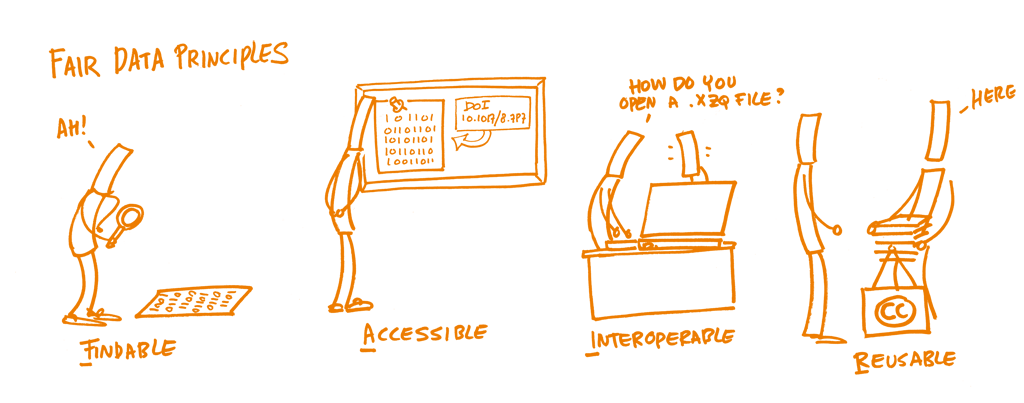-
Notifications
You must be signed in to change notification settings - Fork 2
/
fair-data.qmd
27 lines (14 loc) · 2.64 KB
/
fair-data.qmd
1
2
3
4
5
6
7
8
9
10
11
12
13
14
15
16
17
18
19
20
21
22
23
24
25
26
27
# FAIR data

Picture: [FAIR principles](https://www.ugent.be/img/doza/beleid/fair-data.png) / Patrick Hochstenbach / [CC0 1.0](https://creativecommons.org/publicdomain/zero/1.0/)
In the GUTS consortium, we are committed to the [FAIR principles for research data](https://www.go-fair.org/fair-principles/). As can be seen in the picture above, FAIR is an abbreviation of Findable, Accessible, Interoperable and Reuseable. Here, we will give a quick overview of what those principles mean in practice and how we try to improve the FAIRness of the data collected by the GUTS consortium.
## Findable
Metadata and data should be easy to find for both humans and computers. In the GUTS consortium, we plan to add machine-readable [metadata](metadata.qmd) from the start. Data is stored on [SURF Yoda](https://www.eur.nl/en/research/research-services/research-data-management/tooling/surf-yoda) storage, a research data management system that facilitates and enforces adding structured metadata to your research data. More information about metadata standards can be found in the pages about [metadata](metadata.qmd) and [GUTS standards](how-to-save-your-data.qmd).
## Accessible
In practice, this means that potential users of the data need to know how the data can be accessed. This does not mean that data should always be *open* or *free*. Given the sensitive nature of much of the GUTS data, the plan is in a later stage of the project to make the data available under strict access conditions to other researchers. For accessibility, we will clearly specify the conditions and procedure for access.
## Interoperable
Interoperability is about how data integrates with other data and with tools for analysis, storage, and processing. The practical steps we take within GUTS is using [open file formats](data-formats.qmd) for data, community standards for [metadata](metadata.qmd), and publishing a [GUTS schema](https://guts-consortium.github.io/schema/) to describe the data. These steps allow for a "common understanding" of digital objects for both humans and machines.
## Reusable
To cite the [Go FAIR website](https://www.go-fair.org/fair-principles/):
> The ultimate goal of FAIR is to optimise the reuse of data. To achieve this, metadata and data should be well-described so that they can be replicated and/or combined in different settings.
In the GUTS consortium, we try to achieve this by richly describing the context under which the data was generated. For example, for MRI data we use the [BIDS standard](https://bids.neuroimaging.io/) in which imaging data is accompanied by machine-readable metadata in sidecar JSON files.